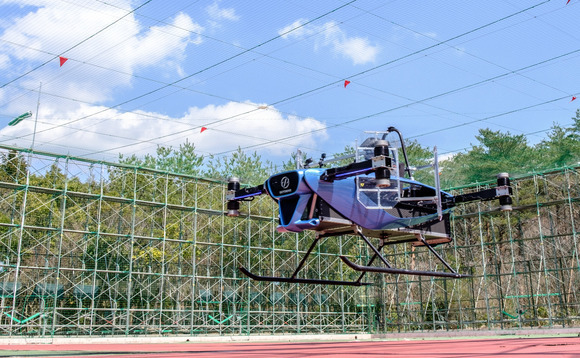
Deal focus: Putting Asia on the air mobility map

Japan’s SkyDrive leads Asia in the niche but potentially society-altering category of flying cars. A $37 million Series B round marks the latest step in a long safety build-out and public acceptance process
Air taxis as a concept make more sense in Asia than most regions, given the high-density nature of the cities and the strong momentum in smart urban development initiatives. But while Asia has punched above its weight in electrification, shared mobility and drones, it suffers from a lack of aerospace expertise on par with the Boeings, Airbuses, and Lockheed Martins of the West.
Much of the development in flying taxis has therefore concentrated on North America and Europe, with notable examples including the Uber Elevate and Uber Air brands in the US and Germany's Lilium. SkyDrive, a Japanese flying car developer that claims to have created the world's smallest electric vertical take-off and landing (eVTOL) vehicle, is arguably the only Asian player to see significant traction.
In the past two months, SkyDrive has signed its 100th corporate sponsorship agreement and executed Japan's first public manned eVTOL flight demonstration. This week it raised a JPY3.9 billion ($37 million) Series B round with contributions from Development Bank of Japan, a host of strategic technology partners, and local VCs such as Strive and Drone Fund.
"This is an important moment for the aircraft industry in Japan and Asia because eVTOL and flying cars are a good opportunity to join an industry dominated by the US and EU," says Tomohiro Fukuzawa, SkyDrive's president. "Flying cars have a lot fewer parts than traditional big aircraft, and Japan has already proven that it's very good at cars and small mobility. Our product will not only change cargo businesses and daily life in urban transport, but it will also help develop a new industry of aircraft OEMs [original equipment manufacturers] in Asia."
Sourcing much of its engineering knowhow from Mitsubishi, SkyDrive hopes to launch a commercial product by 2023 that costs only JPY2-3 million per unit. Its prototype, known as Cartivator, requires only as much ground space as two parked cars and is said to be as quiet enough to operate without ear protection. The all-electric vehicle would be serviced in part by charging stations on top of tall buildings.
Safety and societal acceptance are among the biggest obstacles. This is perhaps especially true in Japan, where recent events such as the rerouting of commercial airliner flights over Tokyo neighborhoods and military helicopter debris raining down on Okinawa have stirred up public backlash. Up to 80% of the technology and components used by Cartivator will need to be upgraded, and automation software will need to be developed.
"The hardest thing is getting certification to start this kind of business," says Fukuzawa. "When you develop automobiles, the cost of certification is 5-7% of the total budget, but for aircraft, certification costs are more than half. We have to ensure the safety of not only the product itself but also the parts, systems, and customer services. There is so much development design and paperwork that goes into that, we might do another funding round next year."
Latest News
Asian GPs slow implementation of ESG policies - survey
Asia-based private equity firms are assigning more dedicated resources to environment, social, and governance (ESG) programmes, but policy changes have slowed in the past 12 months, in part due to concerns raised internally and by LPs, according to a...
Singapore fintech start-up LXA gets $10m seed round
New Enterprise Associates (NEA) has led a USD 10m seed round for Singapore’s LXA, a financial technology start-up launched by a former Asia senior executive at The Blackstone Group.
India's InCred announces $60m round, claims unicorn status
Indian non-bank lender InCred Financial Services said it has received INR 5bn (USD 60m) at a valuation of at least USD 1bn from unnamed investors including “a global private equity fund.”
Insight leads $50m round for Australia's Roller
Insight Partners has led a USD 50m round for Australia’s Roller, a venue management software provider specializing in family fun parks.








